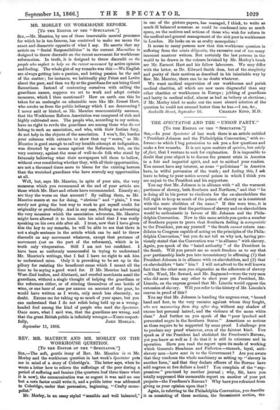REV. MR. MAURICE AND MR. MORLEY ON THE WORKHOUSE QUESTION.
[To THE En]rou OF THE "SPECTATOR.") SIR,—The soft, gentle irony of Rev. Mr. Maurice in re Mr. Morley and the workhouse question in last week's Spectator puts me in mind of a story of Coleridge's. The latter says, when he wrote a letter how to relieve the sufferings of the poor during a period of suffering and famine (the quartexn loaf three times what it is now), the communication was so cogent it was said no one but a corn factor could write it, and a public letter was addressed to Coleridge, under that persuasion, beginning, "Crafty mono- polist."
Mr. Morley, in an essay styled "sensible and well balanced," in one of the picture papers, has managed, I think, to write as much ill balanced nonsense as could be condensed into so much space, on the motives and actions of those who wish for reform in the medical and general management of the sick poor in workhouses. in London. He looks on us as crafty monopolists !
It seems to many persons now that this workhouse question is. suffering from the nimia diligentia, the excessive zeal of too many innocent amateur writers. But certainly the last persons in the world to be drawn in the colours lavished by Mr. Morley's brush are Mr. Earnest Hart and his fellow labourers. We may differ- with the latter, as Dr. Edward Smith does, but of the simplicity- and purity of their motives as described in his inimitable way by Rev. Mr. Maurice, there can be no doubt whatever.
We want medical supervision of our workhouses and parish medical charities, all which are now more disgraceful than any other charities or workhouses in Europe ; jobbing of guardians. and laxity in medical relief, almost as bad as bribery at elections ; if Mr. Morley tried to make out the most absurd solution of the question he could not succeed better than he has.—I am, &c..






























 Previous page
Previous page